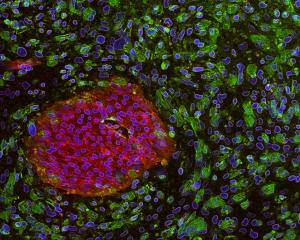Illustration shows a human embryonic
stem cell colony expressing insulin-like
growth factor (IGF) receptors (red),
surrounded by niche cells expressing
fibroblast growth factor (FGF)receptors
(green). Blue indicates the nucleus of
all cells in the dish. (Credit: Image
courtesy of McMaster University)
| °@ |
Human Embryonic Stem Cells Are The Ultimate Perpetual Fuel Cell,
Study Shows |
||||||
| °@ |
Science Daily
(July 13, 2007) °X A startling discovery on the development of human
embryonic stem cells by scientists at McMaster University will change
how future research in the area is done. °@
Researchers are interested in the relationship between stem cells and their niche, because the niche represents a route for modifying stem cell behaviour -- if human ES cells can be reliably guided down a particular pathway, then they can be more readily used for future clinical therapy to regenerate damaged tissue such as neurons for Parkinson's disease, or insulin producing cells for diabetes . The research has been funded by the Canadian Institutes for Health Research and the National Cancer Institute of Canada. The Nature article is the latest in a series of important papers published by scientists at the 18-month-old institute, which was established with funding by philanthropist Michael G. DeGroote. The institute has a research focus on the molecular determinants of cancer and tissue repair and is building scientific momentum. "This discovery of a new fundamental understanding about how human stem cells develop is the kind of scientific work which has already put this Institute on the map as the leader in this field," said John Kelton, dean and vice-president of McMaster's Faculty of Health Sciences. Mick Bhatia said that he and his scientific team have been working for
the past year to prove themselves wrong, but as every test confirmed
their discovery, it was time to submit the work for international peer
review from other experts. The paper will be published electronically on Nature's website on July
11, but will be published in print later this month. |
||||||
| °@ |
The paper will be published electronically on Natureís website on July 11, but will be published in print later this month.
McMaster
University, a world-renowned, research-intensive university, fosters a
culture of innovation, and a commitment to discovery and learning in
teaching, research and scholarship. Based in Hamilton, the University,
one of only four Canadian universities to be listed on the Top 100
universities in the world, has a student population of more than 23,000,
and an alumni population of more than 125,000 in 125 countries. |
||||||
| °@ |
Special: This article is reproduced solely for the dissemination of
information needs, does not mean that the representative views of the
site or confirm the authenticity of its contents; like other media,
websites or individuals reproduced from the use of this site should be
retained as specified on this website "source", and own the copyright
and other legal responsibilities; author who does not want to be
reprinted or contact the reprint royalties and other matters, please
contact us. |
||||||
| °@ |
|
||||||
| °@ | °@ | ||||||
| °@ | Copyright © 2000-2010 American Culture University. All Rights Reserved. |
||||||
